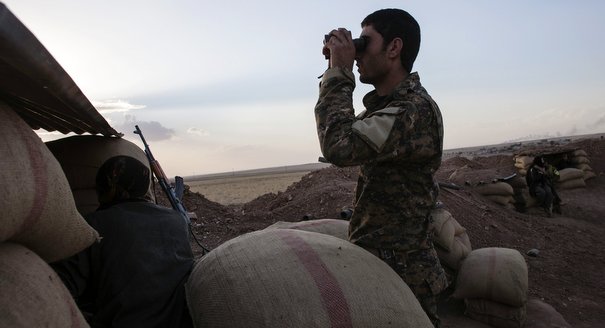This is the fifth piece in a series on the Islamic Front, the largest alliance of rebel groups fighting Bashar al-Assad’s government in Syria. The first post can be found here.
The Islamic Front, widely seen as the largest alliance of rebels fighting Syrian President Bashar al-Assad, is an umbrella movement of seven different groups. It has presented unified positions on a number of issues, but in one case the Islamic Front has had trouble reconciling its stated ideological agenda with political reality—namely, the Kurdish question.
Ideologically, the Islamic Front presents itself as a Sunni Muslim project true to the Islamic ideal of nonracial Muslim solidarity. Such a project should in theory appeal equally to Kurdish and Arab Sunnis, given that the front has explicitly rejected Syria’s long-dominant Arab nationalist ideology. In a Syrian context, Arab nationalism is typically identified with the ruling Baath Party, and the Islamic Front has been very clear in its condemnation of historical injustices against Syrian Kurds, such as the banning of their language and culture. Its manifesto states that the Kurds are a legitimate indigenous people in Syria and denounces the regime’s treatment of them “in the name of the Arab nationalist lie.”
At the same time, all of the major member groups in the Islamic Front are led by Arabs, with at most a token number of Kurdish members. Some of these Arab commanders seem to have been influenced by the anti-Kurdish discourse promoted by the Baath Party over the past half century, particularly the routine equation of Kurdish politics with separatism.
Opposing the Main Kurdish Groups
In practical terms, several of the Islamic Front’s member factions are locked in armed struggle with the dominant Kurdish armed force, the People’s Protection Units (YPG)—a powerful northern militia force that is linked to Turkey’s Kurdistan Workers’ Party (PKK) and its Syrian affiliate, the Democratic Unity Party (PYD).
The PKK and its proxies are all influenced by leftist and secular ideologies, and they appear more interested in their own Kurdish project than in toppling Assad. This has brought them into conflict with the Arab opposition in general and the Islamists in particular. Like many other opposition groups, the Islamic Front will depict the PYD and its militia as tools of the Assad regime, labeling them “shabbiha”—a term of abuse for Assad supporters—while fighting them on the same terms as they fight government forces.
Hostile to Kurdish Self-Rule
In summer 2013, the PYD announced a project for “democratic self-administration” in northern Syria. These plans have progressed ever since, and the group recently elected a PYD-controlled local government for the northeastern Qamishli area. Virtually all Arab-led opposition factions oppose this process, with the National Coalition for Syrian Revolutionary and Opposition Forces, a coalition of opposition groups in exile, slamming it as Kurdish separatism.
The Islamic Front, quite predictably, agrees. In an interview with Al Jazeera in December, the head of the front’s political office, Hassan Abboud, who also leads the powerful Salafi faction called Ahrar al-Sham, was careful to blame the self-administration project on “a particular clique” in Kurdish society—meaning the PYD. “We say to our Kurdish brothers in Syria: that yes, it’s true that they were oppressed under the rule of the Baath,” he told Al Jazeera’s reporter, but then quickly concluded that “this cannot be a reason to declare independence from the rest of their brothers, in cantons that wouldn’t be viable anyway.”
Echoing widely held fears within the Arab opposition, Abboud argued that “such a step would be followed by or be used to justify similar attempts. For example, it might be followed by an attempted micro-state of the Noseiris [Alawites], but as we’ve written in our manifesto, Syria’s territory cannot be divided or partitioned based on sectarian or other identities.”
The Kurdish Islamic Front
Despite all this, the Islamic Front actually has a Kurdish member faction, which was seemingly a last-minute addition to the roster declared on November 22: the Kurdish Islamic Front (KIF).
The KIF is far smaller than the other member factions, and its background is somewhat unclear. It was apparently created by Sheikh Abu Abdullah al-Kurdi, an Islamist activist from the Kurdish-populated Afrin area north of Aleppo (now largely under PYD and YPG control). KIF spokesperson Salaheddin al-Kurdi says the group strives “to defend the rights of the Kurdish people” and to establish “an Islamic province in the Kurdish areas, which will be run by the sons of the Muslim Kurdish people.”
However, Sheikh Abu Abdullah admits to having formed the KIF with support from Ahrar al-Sham and other groups. Presumably, the Arab Islamists saw the creation of a Kurdish Islamist faction as a way to dispel the impression that their conflicts with the YPG are ethnically motivated—and the KIF’s role is mainly to put a pluralist face on an alliance that subscribes to a universalist Islamic ideology but that is deeply influenced both by the political outlook of Syria’s Arab majority and by its battles with the Kurds of the YPG militia.
Previous posts in this series:
The Politics of the Islamic Front, Part 1: Structure and Support (January 14, 2014)
The Politics of the Islamic Front, Part 2: An Umbrella Movement (January 15, 2014)
The Politics of the Islamic Front, Part 3: Negotiations (January 16, 2014)
The Politics of the Islamic Front, Part 4: The State (January 17, 2014)






